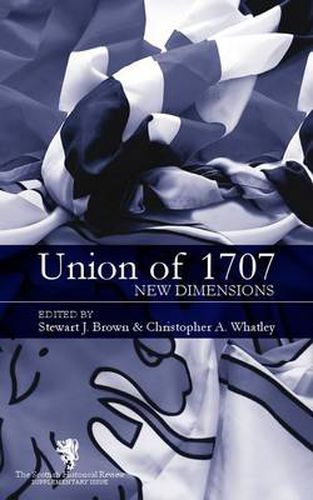Readings Newsletter
Become a Readings Member to make your shopping experience even easier.
Sign in or sign up for free!
You’re not far away from qualifying for FREE standard shipping within Australia
You’ve qualified for FREE standard shipping within Australia
The cart is loading…






This collection brings together a series of papers that in May 2007 were presented at a Royal Society of Edinburgh conference organised to mark the 300th anniversary of the Union of 1707. One of the guiding objectives of the RSE event was to showcase the work of younger historians, and to present new work that would provide fresh insights on this defining moment in Scotland’s (and the United Kingdom’s) history. The seven chapters range widely, in content and coverage, from a detailed study of how the Church of Scotland viewed union and how concerns about the Kirk influenced the voting behaviour in the Scottish Parliament, through to the often overlooked broader European context in which the British parliamentary union - only one form of new state formation in the early modern period - was forged. The global War of the Spanish Succession, it is cogently argued, influenced both the timing and shape of the British union. Also examined are elite thinking and public opinion on fundamental questions such as Scottish nationhood and the place and powers of monarchs, as well as burning issues of the time such as the Company of Scotland, and trade. Other topics include an investigation of the particular intellectual characteristics of the Scots, a product of the pre-Union educational system, which it is argued enabled professionals and entrepreneurs in Scotland to meet the challenges posed by the 1707 settlement. As one of the contributors argues, union offered the Scots only partial openings within the empire.
$9.00 standard shipping within Australia
FREE standard shipping within Australia for orders over $100.00
Express & International shipping calculated at checkout
This collection brings together a series of papers that in May 2007 were presented at a Royal Society of Edinburgh conference organised to mark the 300th anniversary of the Union of 1707. One of the guiding objectives of the RSE event was to showcase the work of younger historians, and to present new work that would provide fresh insights on this defining moment in Scotland’s (and the United Kingdom’s) history. The seven chapters range widely, in content and coverage, from a detailed study of how the Church of Scotland viewed union and how concerns about the Kirk influenced the voting behaviour in the Scottish Parliament, through to the often overlooked broader European context in which the British parliamentary union - only one form of new state formation in the early modern period - was forged. The global War of the Spanish Succession, it is cogently argued, influenced both the timing and shape of the British union. Also examined are elite thinking and public opinion on fundamental questions such as Scottish nationhood and the place and powers of monarchs, as well as burning issues of the time such as the Company of Scotland, and trade. Other topics include an investigation of the particular intellectual characteristics of the Scots, a product of the pre-Union educational system, which it is argued enabled professionals and entrepreneurs in Scotland to meet the challenges posed by the 1707 settlement. As one of the contributors argues, union offered the Scots only partial openings within the empire.